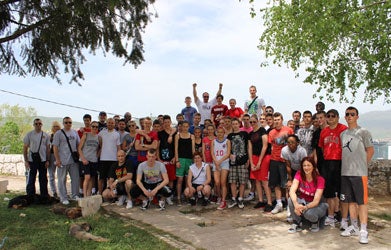Title: Bosnia Benefits From Georgetown Sports Diplomacy Program
A sports diplomacy program founded by a former Georgetown basketball player is now reaching out to the former Yugoslavian war-torn country of Bosnia.
The Bosnia Basketball Diplomacy Program developed as an offshoot of the original Georgetown Basketball Diplomacy Project led by Sead Dizdarevic (C’07, G’13).
The latter project has been holding camps in the Balkan region since 2008.
The diplomacy program is sponsored by Georgetown University Athletics and the Center for Intercultural and Education Development (CIED), and funded by the U.S. Department of State’s Bureau of Educational and Cultural Affairs.
Universal Pride
 In addition to sport and leadership training, Bosnia Basketball Diplomacy Program participants in Sarajevo cleaned up a local park as part of a service project.
In addition to sport and leadership training, Bosnia Basketball Diplomacy Program participants in Sarajevo cleaned up a local park as part of a service project.
“Over the last several years, the U.S. Department of State’s Bureau of Educational and Cultural affairs has built profound personal, cultural and diplomatic connections across the globe through the universal pride of athletics,” says Katie Leasor of the U.S. State Department. “During this exchange program, Americans and Bosnians come together through a shared language of sports, in this case basketball.”
More than 300 children and 40 coaches have benefitted from the camps in countries such as Montenegro and Slovenia.
Dizdarevic says he came up with the idea of the camps during his undergraduate years at Georgetown.
“We’re all basically just kind of transferring our knowledge of what we learned at Georgetown and the Georgetown tradition in helping disadvantaged kids,” the Montenegro native says.
Comprehensive Approach
The Bosnia program, according to CIED Director of Business Development Chris Shirley, is a three-phased program that involves both players and coaches.
“Instead of a yearly basketball and leadership camp for young people in the country, this is really a much more comprehensive approach because we’re working with coaches [to develop leadership and coaching programs],” Shirley says.
The first phase of the program took place this April and May in Bosnia and Herzegovina, where 12 coaches and sports leaders taught 36 boys and girls to basketball and leadership skills.
The second phase brought the 12 Bosnian coaches to Georgetown for a 20-day program. The coaches worked with local organizations that develop programs for at-risk youth, attended workshops on inter-ethnic sports programs and assisted at basketball youth camps, including Georgetown Head Coach John Thompson III’s boys basketball camp.
The final phase, which takes place in the fall, will allow the Bosnian coaches to implement in their own country the programs they designed while in Washington, D.C.
Hard Goodbyes
Chris Golski (C’09, G’10), a former Georgetown basketball player, adds that the ethnically and religiously diverse group of participants connected well with each other throughout the week.
“Those goodbyes were hard and everyone had a sense that it was a unique opportunity and they were a part of something special,” he says.
Golski also says that Thompson has praised the program.
World-Class Institution
Georgetown is a world-class institution [with its] huge international influence helped me develop this program to where it is right now and hopefully it will help me develop it into something else in the future.”
—Sead Dizdarevic (C’07, G’13), Bosnia Basketball Diplomacy Program Founder
“Every time that coach goes to an event for this initiative … the first thing he always says is how proud he is,” Golski says. “It’s one of the things he enjoys most about being a coach is watching the players he coached grow up and accomplish things in their lives.”
Dizdarevic thanked the State Department and Georgetown for all the support it has given him over the years.
“If I were at another university I wouldn’t be able to do this type of thing,” he says. “Georgetown is a world-class institution [with its] huge international influence helped me develop this program to where it is right now and hopefully it will help me develop it into something else in the future.”